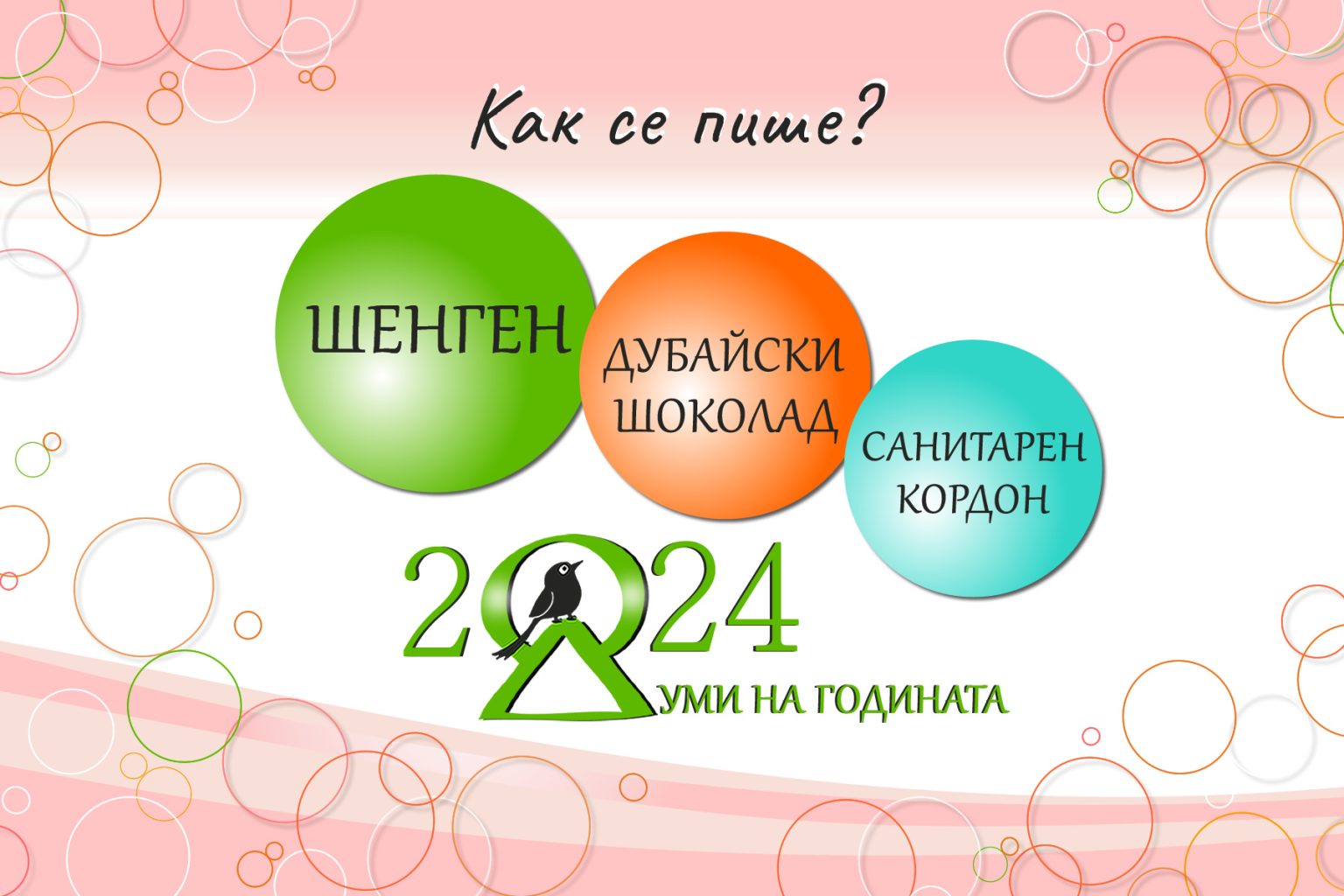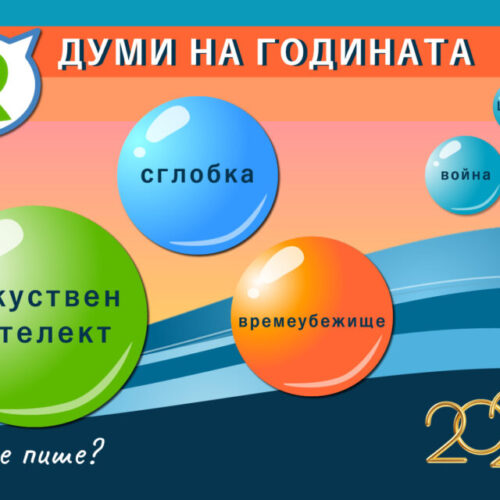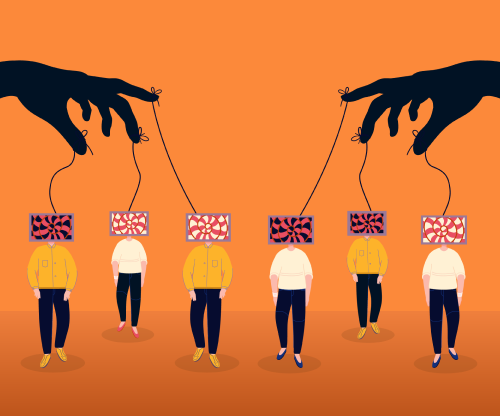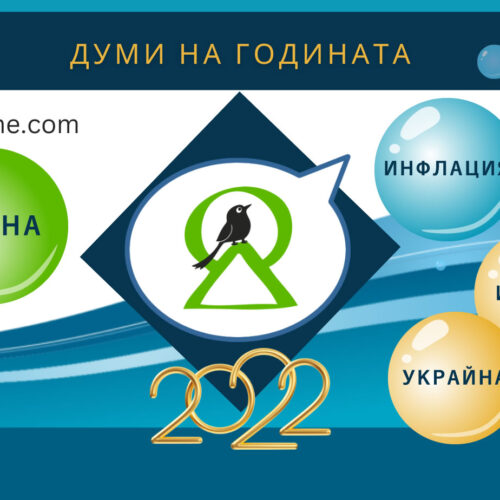“Schengen,” Bulgaria, and Donald Trump—these are the “Words of the Year 2024,” as determined by the campaign organized by Kak se pishe?. Schengen was chosen by both the public and the campaign’s jury. Meanwhile, Bulgaria emerged as the most frequently used word in the Bulgarian information space, and Donald Trump was the most mentioned personality, according to media analysis conducted by the Sensika global media monitoring and analytics system. The results are based on 9.6 million publications from 10,123 Bulgarian-language online information sources, covering the period from January 1 to December 31, 2024.
Sensika’s Monitoring
Sensika’s monitoring system provides the ability to track trends in the information environment. Beyond observing the real-time dynamics of word and personality popularity, the data reveals shifts in narratives within traditional and social media that influence political and public attitudes.
For yet another year, the initiative highlights the most significant topics and stories from the past year by analyzing language use both among the public and in the media.
“Dubai Chocolate” and “Sanitary Cordon”
In the public attitudes survey, Schengen led with 37%, followed by Dubai chocolate with 26%, and sanitary cordon with 24%. Other words in the top ten included Gundy (which narrowly missed the top three), elections, disinformation, water shortage, Trump, New Beginning, and Olympics.
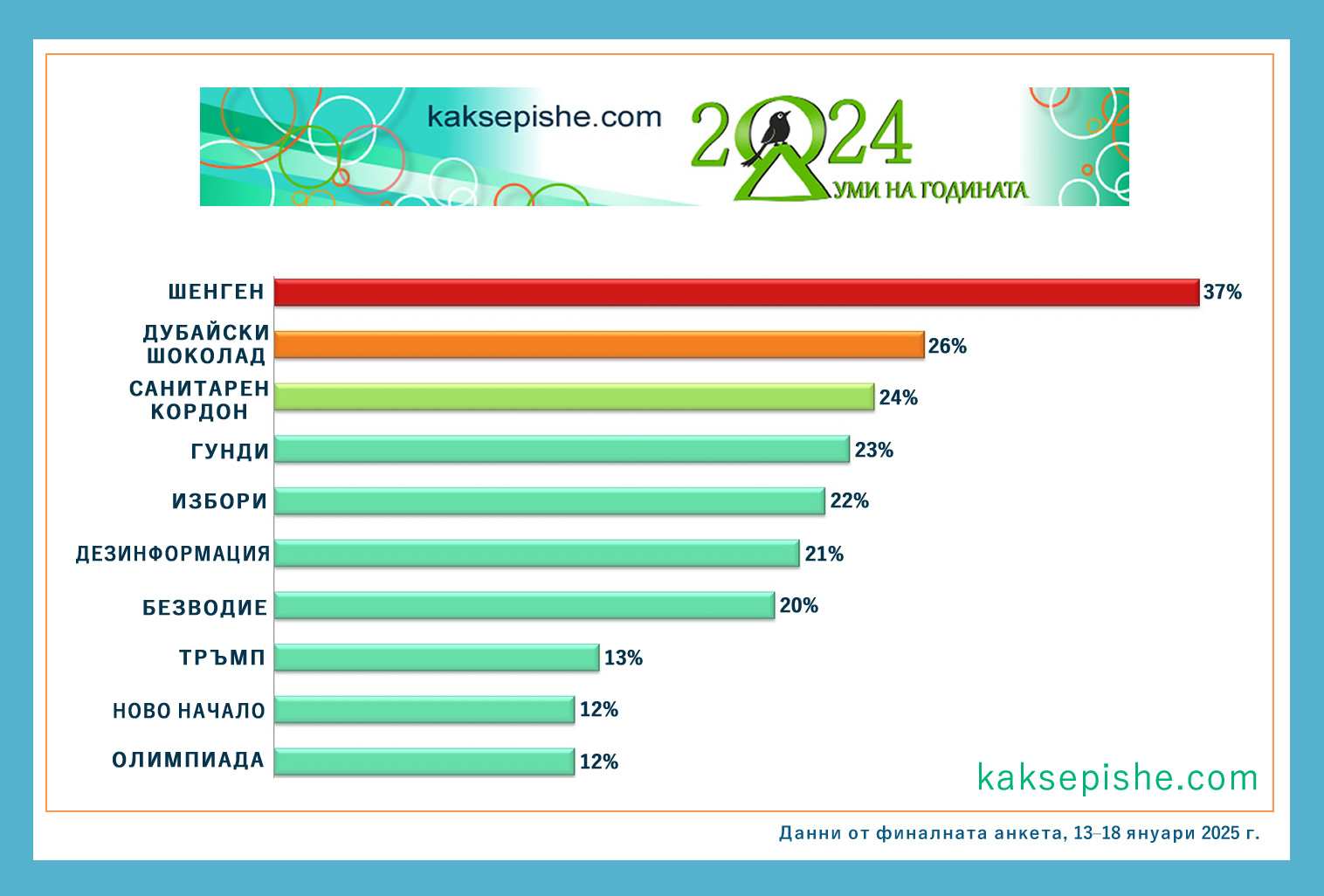
“The winning word, Schengen, clearly signals Bulgarians’ European orientation and appreciation of the benefits of EU membership,” noted the organizers of the initiative—Dr. Pavlina Varbanova, creator of Kak se pishe?, and Dorothea Nikolova, a teacher of Bulgarian language and literature and a journalist.
Dr. Varbanova suggested that the second-place term, Dubai chocolate, might reflect a sense of disillusionment with domestic realities, prompting people to seek pleasure in something external and apolitical. However, she also offered a more troubling interpretation: the growing power of social media poses increasing risks. “Just as this year we chose Dubai chocolate, it’s possible that soon we may give significant power to a TikTok politician,” Dr. Varbanova warned.
In comparison to last year’s winner—artificial intelligence, which connected Bulgaria to global trends—sanitary cordon offers an introspective view of Bulgarian society. According to Varbanova and Nikolova, it highlights the dividing lines and polarization within the country, as well as the challenges in achieving consensus on national development.
Dorothea Nikolova also remarked that Gundy narrowly missed entering the top three. “I believe we need positive and inspiring examples in these turbulent times,” she said. She emphasized the importance of the sixth-place word, disinformation, stating that “we are increasingly and voluntarily engaging in the distortion of reality, which deeply impacts the choices we make for our future.”
“The Words of the Year this time were born out of difficulty. Almost every one of the ten finalist words carries a paradox or is laden with irony—just like life itself,” commented jury member Vesselina Sedlarska. She summarized:
- Schengen: “So long-awaited that the joy disappeared with its arrival.”
- Dubai chocolate: “The luxury of a life that is both oversaturated and hungry.”
- Sanitary cordon: “The illusion that politics has anything to do with hygiene.”
The survey of public attitudes was conducted in three stages:
- January 6–10: The public was invited to suggest words for “Word of the Year” via the Facebook, Threads, and X pages of Kak se pishe?. A total of 227 unique words and phrases were submitted.
- Second Stage: From the 30 most-voted suggestions, a six-member jury shortlisted 10 finalists.
- January 13–18: An online poll determined the three most significant words of the year.
Top 20 in the Information Space
The 20 most frequently mentioned words in the Bulgarian-language information space are:
“Bulgaria,” “Europe,” “USA,” “Russia,” “child,” “war,” “Ukraine,” “help,” “politics,” “minister,” “president,” “support,” “elections,” “price,” “party,” “family,” “government,” “social,” “leadership,” and “doctor.”
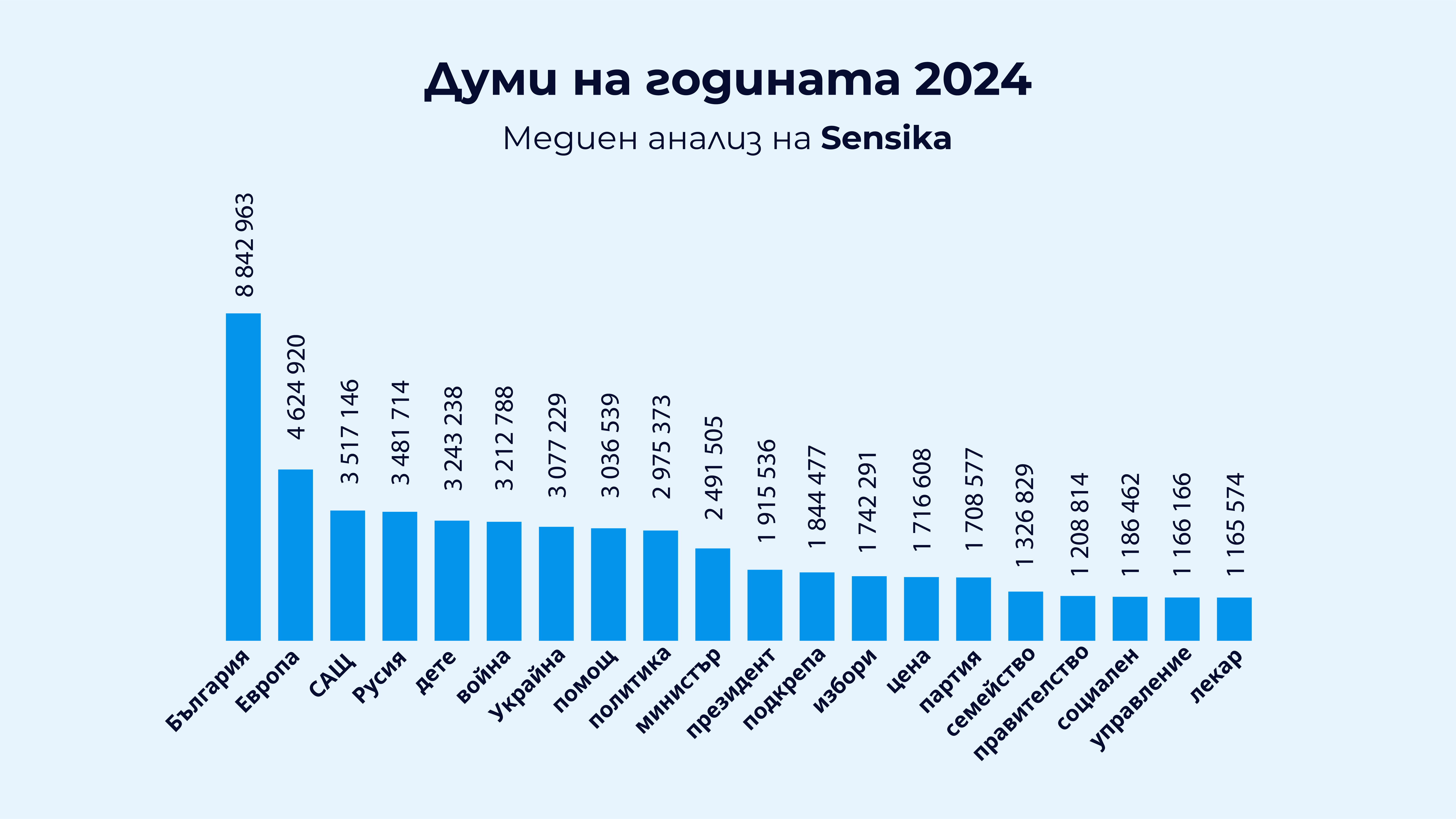
The analysis was conducted by Sensika. Out of the public survey rankings and the media-based word rankings, only two overlaps were found: the name of U.S. President Donald Trump, which tops the list of the most popular individuals in the media, and the word “elections.”
“Child” and “war” remain leading topics in the media, as they did last year, ranking just after the most frequently mentioned proper nouns—Bulgaria, Europe, USA, and Russia. According to the organizers of “Word of the Year,” concern for children has firmly established itself in public and media discourse.
Two new words entered the top 20 this year—“social” and “doctor”—which highlights the growing media focus on social welfare and healthcare as key issues alongside political topics.
Trump Dethrones Borissov
For the second time, a ranking of the most mentioned personalities in the media has been presented. Donald Trump claimed the top spot, followed by Boyko Borissov, who closely trailed two others behind him—Vladimir Putin and Delyan Peevski. The list continues with Rumen Radev, Joe Biden, Kiril Petkov, Volodymyr Zelensky, Nikolay Denkov, Ahmed Dogan, Asen Vassilev, Maria Gabriel, Cornelia Ninova, Kalin Stoyanov, Emmanuel Macron, Vasil Terziev, Kostadin Kostadinov, Elon Musk, Borislav Sarafov, Grigor Dimitrov.
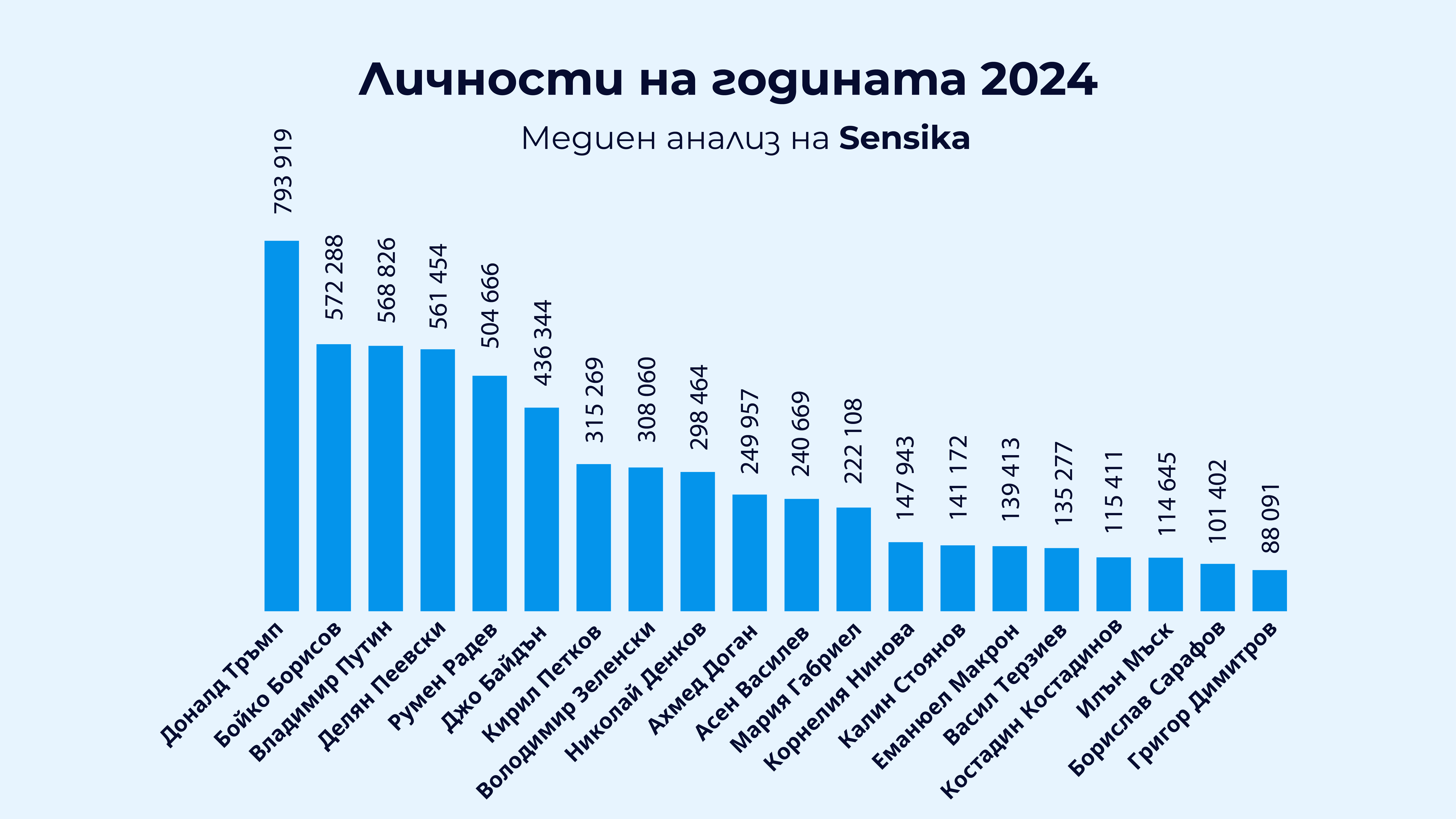
Borissov, who held the top spot last year, has now been overtaken by Trump. Delyan Peevski has notably risen in the rankings, while Ahmed Dogan made his debut in this year’s list.
It is worth noting that Sofia’s Mayor, Vasil Terziev, also made it into the top 20. The only non-political figure in the ranking is Grigor Dimitrov, the renowned tennis player.
The Change
In 2023, the top words chosen by the public were “artificial intelligence,” “assembly,” and “time shelter.”
In 2022, the leading words were “war,” “inflation,” “Ukraine,” and “elections.”
In 2021, the top three words in the survey were the informal “decision-making,” “anti-vaxxer,” and “erasure.”
The Jury
The jury for 2024 consisted of long-standing observers, participants in public processes, and linguistic experts:
- Dr. Pavlina Varbanova – creator of the platform “Kak se pishe?”
- Assoc. Prof. Georgi Lozanov – philosopher and media expert.
- Vesselina Sedlarska – journalist and writer.
- Dorothea Nikolova – teacher of Bulgarian language and literature and journalist.
- Dr. Ivan Landzhev – poet and essayist.
To include the perspective of younger generations, this year’s jury was joined by actor and vlogger Stefan Popov – Chefo.
